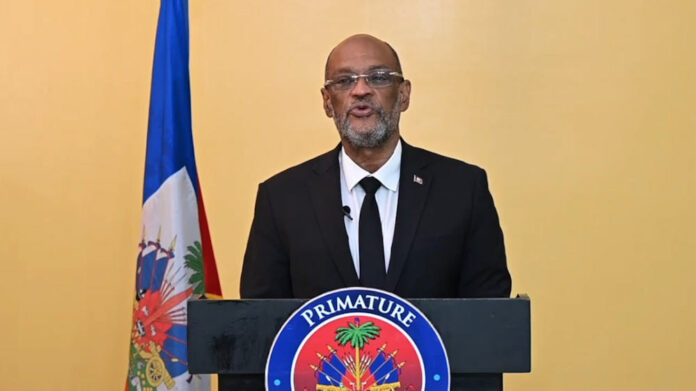
PORT-AU-PRINCE — On the one-year anniversary of his ascension as Haiti’s interim Prime Minister, Ariel Henry said he is committed to bringing peace to the country, holding elections, and combating corruption, inflation, and gas shortages.
He also thanked Haitians for “proving their intelligence and maturity” by accepting, without crippling protests, recent hikes in gas prices as the government has cut its fuel subsidies. The price hikes will “progressively” continue, because “this is the only condition that will allow us to continue importing fuel and make it available permanently,” Henry said in his taped Jul. 21 address, meant to be a sort of state-of-the-union update to the nation.
“Nor must dialogue be an opportunity to waste time in useless quarrels and to needlessly prolong the suffering of people and this situation of chronic instability,” Henry added, referring to his on-again off-again negotiations with the Montana Accord coalition, a rival political formation which has a different road-map of how to get Haiti out of its quagmire.
Critics pounced on Henry’s statements, saying he is handing over management of the country’s affairs to others, and numerous protest movements have drawn crowds railing against Haiti’s continued decline in the past year.
“Ariel Henry’s address to the nation is pathetic, the Justice system is at its worst under his government,” Arnel Remy, a signatory of the Montana Accord, told The Haitian Times. “There is more illegal immigration now because people want to flee this climate of violence that has worsened. We are even more humiliated in foreign countries. Nothing has improved.”
In Port-au-Prince, public transport operators deeply impacted by the fuel crisis led some of the demonstrations against Henry after his speech, which lasted about 11 and a half minutes. Only the last minute of the address was in Kreyòl, Haiti’s principal language. The rest of it was in French, which is spoken by only a small minority of Haitians.
“This guy works for himself and his international bosses,” said Carl Destiné, a Champs-de-Mars passerby. “How come the first decision of his government is to increase the price of fuel? This has made life more difficult for the most disadvantaged.”
“Yet, no measure has been taken to reduce the constantly increasing cost of living,” Destiné said.
Henry said he also wants to establish a credible electoral process that ensures participation to legitimize elected officials and reach a consensus. He appealed for dialogue with the political parties and promised the diaspora that he would do his best for them to take part in Haiti’s future.
Henry also called on the international community to provide effective support in line with the priorities he shared and take the country’s needs into account.
What Henry failed to say or do, many Haitians complained, was lay out any plans to address issues hobbling Haiti.
“The prime minister did not address the Haitian people,” said a sweets vendor in downtown Port-au-Prince, who did not give her name. “When authorities are lying to us, they speak French, not Kreyòl. They think people won’t understand.”
“What we need is a secure climate, lower prices of fuel and of basic necessities so that we minorities can live,” said Caverns Pierre-Paul, 25, passing in the central Champ de mars area. “I do small jobs to survive. I can barely feed my two children.”
Emmanuel Ménard, president of the reformist political party called Force Louverturienne, said Henry has mismanaged the country and is ruling by decree. Nonetheless, Ménard is among the signatories of a Sep. 11, 2021 political agreement, known as the Musseau Accord, initiated by Henry, to reach a political consensus.
“I must admit that the Prime minister has formed a coalition with a group of people who manage the country’s affairs, but they have failed,” Ménard said. “In one year, there has been no improvement.”
The agreement, signed by various political parties and members of civil society, provides terms for the release of political prisoners, establishing a peace climate, and holding elections. Ménard said the Prime Minister has not kept the promises made in the agreement.
“We are open to dialogue, but it has to be constructive and inclusive,” Ménard said.
An earlier version of this article was published in the Haitian Times.









